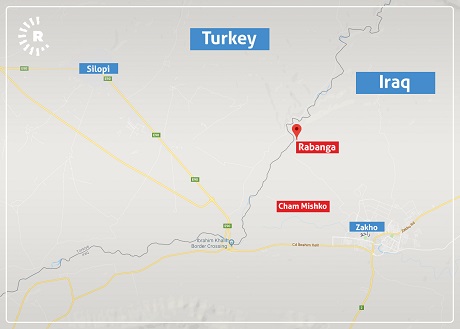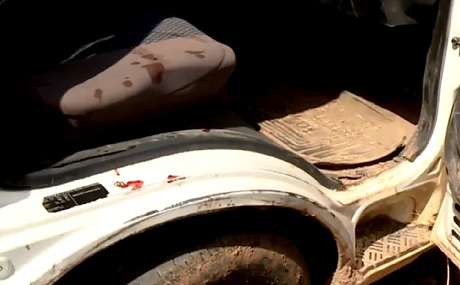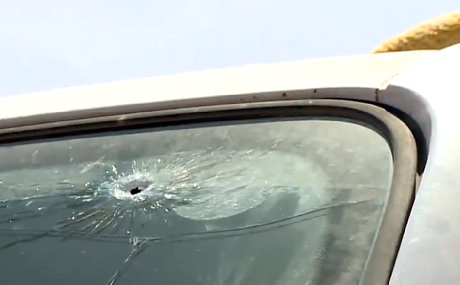ZAKHO, Kurdistan Region – Relatives of a Yazidi man shot dead in the border area between Turkey and the Kurdistan Region in the early hours of Tuesday have accused the Turkish military of unlawful killing.
The three young Yezidis, originally from Shingal, had acquired a plot of farmland there.

As they approached the plot on the Iraqi side at around 4am on Tuesday, they came under fire from the Turkish side. One bullet pierced the windscreen of their white KIA pickup.
“The Turks were firing at us and hitting the vehicle,” Hussein Ali, one of the three Yazidi men, told Rudaw on Tuesday.
“The bullet which went through the windscreen hit [Salih’s] temple.”
The two surviving men hid in the vehicle for an hour as the shooting continued. Unable to escape to find help, their friend bled to death in his car seat.

The young men have farmed this plot of land for two years. Soldiers manning a Turkish outpost across the river had regularly fired warning shots, Ali says.
It is possible Salih and his friends were mistaken for smugglers, who use the secluded spot to move goods under the cover of darkness.
Salih’s family says the men were there in the dark hours of the morning because it was Eid and they wanted to finish work early before visiting their Muslim neighbors.
Yezidi women gathered in Cham Mishko IDP camp on Tuesday afternoon to mourn Salih’s death.
“He was such a young boy, such a pity,” said Laylo Sarko, a relative. “Why did they kill him?”
Civilians living in the border areas between Turkey and Iraqi Kurdistan are regularly maimed or killed in crossfire between the Turkish army and the Kurdistan Workers’ Party (PKK), an armed group fighting for greater political and cultural rights for Kurds in Turkey which Ankara considers a terrorist organization.
The PKK, which began its armed struggle in 1984, uses the Kurdistan Region as a base of operations. Turkey has deployed hundreds of troops deep into the Region and built new bases and outposts on mountaintops with the aim of preventing PKK fighters infiltrating the border.
Both Erbil and Baghdad have called on Ankara to halt its attacks and demanded the PKK withdraw from their territory.
Iraqi President Barham Salih “stressed the need to safeguard Iraqi sovereignty and rejected any unilateral military action beyond Iraq’s borders,” when he met with his Turkish counterpart Recep Tayyip Erdogan in Istanbul last week.
Up to 40,000 people have died in the conflict since 1984. At least 4,397 people have been killed since the short-lived peace process collapsed in 2015, according to the International Crisis Group.
Salih’s body was taken back to his place of birth in Shingal for burial on Tuesday morning.
He had fled alongside his family and several hundred thousand Yezidis in August 2014 when the Islamic State group (ISIS) seized their ancestral homeland, killing thousands and pillaging the area.
“Every day, the Turks shoot at us, the central government and the regional government does not assist the people at all,” said Mirza Omar, another relative. “The people are poor and the family does not even have 1,000 dinars.”
Years after Shingal was retaken from ISIS, thousands of Yezidis still live in poverty in IDP camps across the Kurdistan Region. A lack of security, jobs, and basic services has prevented many from returning.
With reporting by Yusuf Mousa
Amin Salih, 20, and two of his friends were travelling from the Cham Mishko internally displaced persons’ (IDP) camp in Zakho to an area called Rabanga on the Iraqi side of the river that delineates the border with Turkey.
The three young Yezidis, originally from Shingal, had acquired a plot of farmland there.

Graphic: Ahmed Bahram / Rudaw
As they approached the plot on the Iraqi side at around 4am on Tuesday, they came under fire from the Turkish side. One bullet pierced the windscreen of their white KIA pickup.
“The Turks were firing at us and hitting the vehicle,” Hussein Ali, one of the three Yazidi men, told Rudaw on Tuesday.
“The bullet which went through the windscreen hit [Salih’s] temple.”
The two surviving men hid in the vehicle for an hour as the shooting continued. Unable to escape to find help, their friend bled to death in his car seat.

Salih's blood stains the vehicle interior. Photo: Rudaw TV
The young men have farmed this plot of land for two years. Soldiers manning a Turkish outpost across the river had regularly fired warning shots, Ali says.
It is possible Salih and his friends were mistaken for smugglers, who use the secluded spot to move goods under the cover of darkness.
Salih’s family says the men were there in the dark hours of the morning because it was Eid and they wanted to finish work early before visiting their Muslim neighbors.
The Turkish military has not commented on the incident.
 A single bullet passed through the windscreen, striking Salih in the head. Photo: Rudaw TV
A single bullet passed through the windscreen, striking Salih in the head. Photo: Rudaw TV
Yezidi women gathered in Cham Mishko IDP camp on Tuesday afternoon to mourn Salih’s death.
“He was such a young boy, such a pity,” said Laylo Sarko, a relative. “Why did they kill him?”
Civilians living in the border areas between Turkey and Iraqi Kurdistan are regularly maimed or killed in crossfire between the Turkish army and the Kurdistan Workers’ Party (PKK), an armed group fighting for greater political and cultural rights for Kurds in Turkey which Ankara considers a terrorist organization.
The PKK, which began its armed struggle in 1984, uses the Kurdistan Region as a base of operations. Turkey has deployed hundreds of troops deep into the Region and built new bases and outposts on mountaintops with the aim of preventing PKK fighters infiltrating the border.
Both Erbil and Baghdad have called on Ankara to halt its attacks and demanded the PKK withdraw from their territory.
Iraqi President Barham Salih “stressed the need to safeguard Iraqi sovereignty and rejected any unilateral military action beyond Iraq’s borders,” when he met with his Turkish counterpart Recep Tayyip Erdogan in Istanbul last week.
Up to 40,000 people have died in the conflict since 1984. At least 4,397 people have been killed since the short-lived peace process collapsed in 2015, according to the International Crisis Group.
Salih’s body was taken back to his place of birth in Shingal for burial on Tuesday morning.
He had fled alongside his family and several hundred thousand Yezidis in August 2014 when the Islamic State group (ISIS) seized their ancestral homeland, killing thousands and pillaging the area.
“Every day, the Turks shoot at us, the central government and the regional government does not assist the people at all,” said Mirza Omar, another relative. “The people are poor and the family does not even have 1,000 dinars.”
Years after Shingal was retaken from ISIS, thousands of Yezidis still live in poverty in IDP camps across the Kurdistan Region. A lack of security, jobs, and basic services has prevented many from returning.
With reporting by Yusuf Mousa




Comments
Rudaw moderates all comments submitted on our website. We welcome comments which are relevant to the article and encourage further discussion about the issues that matter to you. We also welcome constructive criticism about Rudaw.
To be approved for publication, however, your comments must meet our community guidelines.
We will not tolerate the following: profanity, threats, personal attacks, vulgarity, abuse (such as sexism, racism, homophobia or xenophobia), or commercial or personal promotion.
Comments that do not meet our guidelines will be rejected. Comments are not edited – they are either approved or rejected.
Post a comment